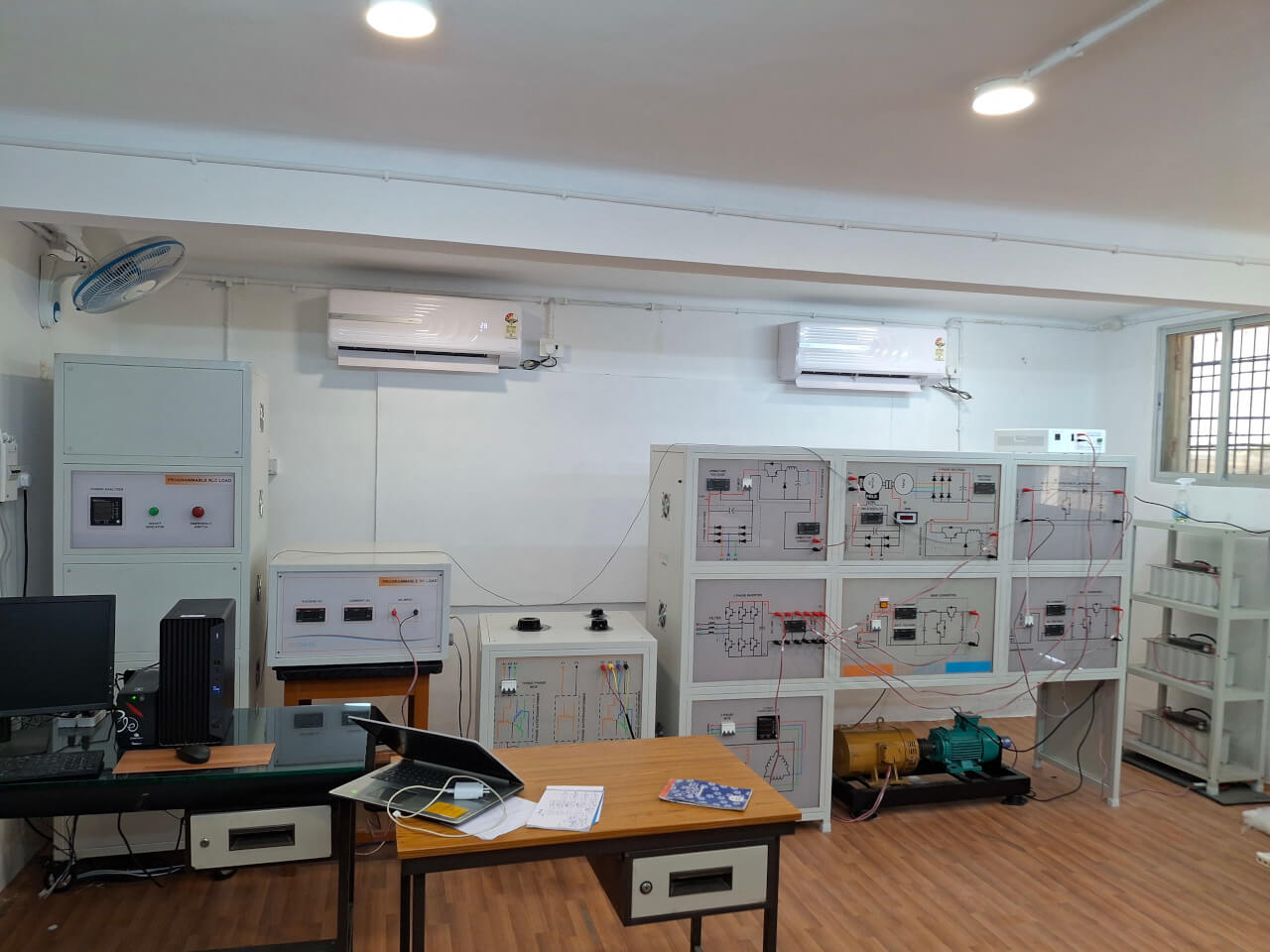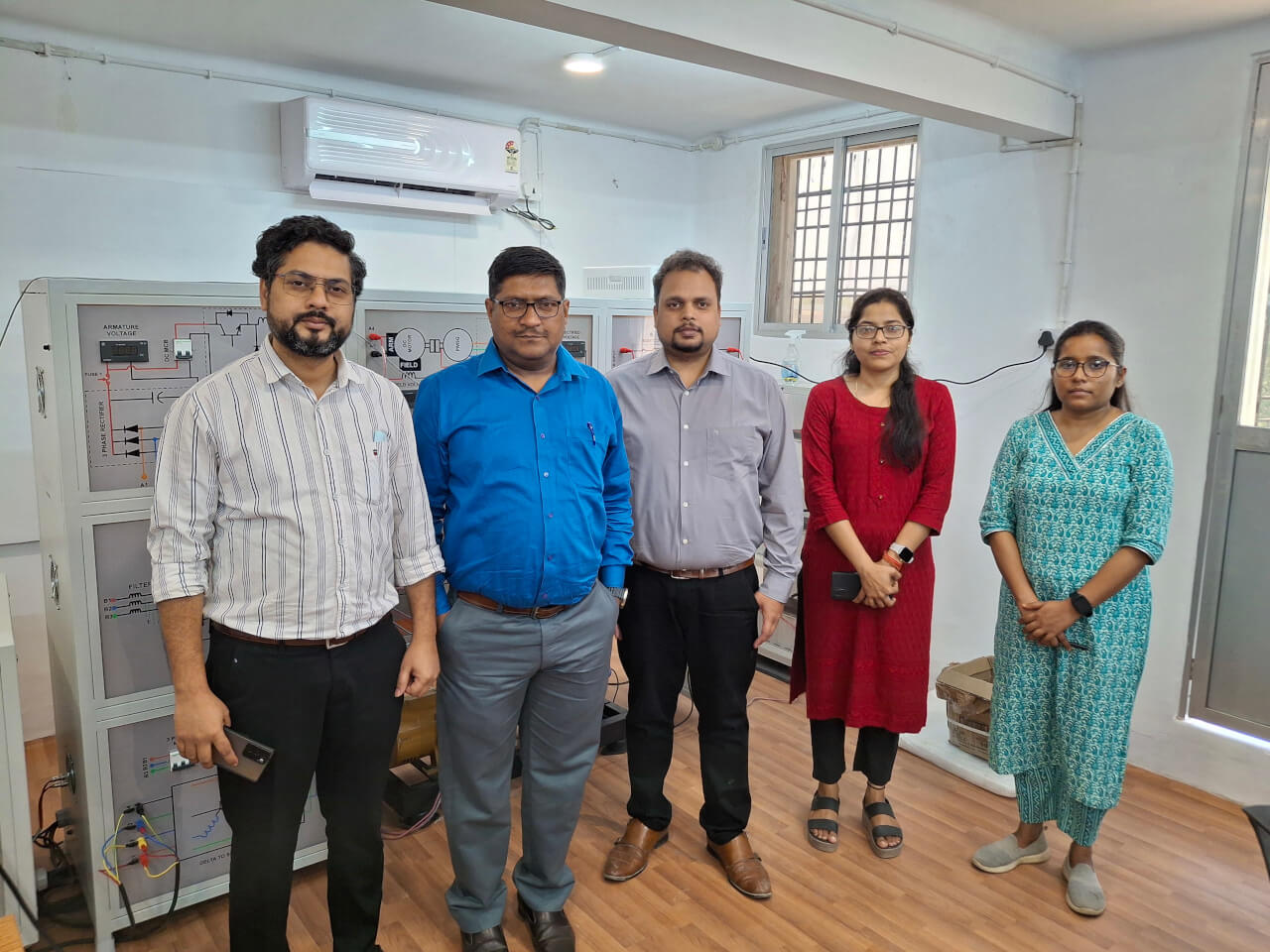Ecosense has successfully installed a state-of-the-art Hybrid AC/DC Microgrid at the Department of Electrical Engineering, MIT Muzaffarpur, reinforcing its commitment to delivering advanced renewable energy solutions. This cutting-edge microgrid integrates multiple energy sources, including a PV Emulator, Wind Turbine Emulator multiple energy storage options including Battery Bank, supercapacitors and AC and DC Loads, enabling researchers to explore microgrid performance in various real-world scenarios.
Advanced Energy Simulation & Research Capabilities
The PV Emulator replicates the behavior of solar photovoltaic panels, allowing researchers to analyze the microgrid's response to solar energy generation. Similarly, the Wind Turbine Emulator mimics the characteristics of a wind turbine, facilitating studies on wind energy integration and its impact on the microgrid system.
With the inclusion of a Battery Bank, Supercapacitor the microgrid supports energy storage research. This setup enables researchers to investigate charging and discharging processes, optimize energy storage solutions, and evaluate system efficiency and stability.
The presence of both AC and DC Loads allows for a comprehensive study of how different types of loads influence microgrid behavior, ensuring a deeper understanding of its operational dynamics.
Why Ecosense’s Hybrid AC/DC Microgrid?
Ecosense’s modular and scalable microgrid system is designed for flexibility and ease of expansion, requiring minimal installation space. The microgrid at MIT Muzaffarpur operates in both grid-connected and standalone modes, with its DC Microgrid output linked to the main AC grid via a Voltage Source Converter (VSC). This dual-mode operation enables researchers to conduct experiments in controlled environments tailored to specific research objectives.
The Microgrid Lab provides a vast array of research opportunities, from tracking torque-speed and power-speed characteristics of a wind turbine at different wind speeds and pitch angles to comparing different PV panels using the PV Emulator. With continuous sensing of grid-side voltage and current, the system allows for the implementation of advanced control algorithms to optimize energy management and smart grid operations.
Key Features & Technical Capabilities
• Ability to track torque-speed and power-speed characteristics of wind turbines under varying conditions
• Comparative analysis of PV panels and their performance under different configurations
• Maximum power point tracking (MPPT) based on real-time voltage and current feedback
• DC link voltage control using a bidirectional converter in standalone mode
• Power quality control and grid integration analysis
• Smart grid implementation with advanced control techniques
• Anti-islanding protection and fault detection across different loads
• Investigation of series-parallel behavior of PV panels in both grid-connected and standalone systems
• Analysis of bidirectional converter operation in battery backup systems
• Performance assessment of DC microgrid integration with AC grids using a 3-phase inverter
• Exploration of different differential equations to simulate various wind turbine models

Ecosense Supplied Hybrid AC/DC Microgrid at MIT Muzaffarpur
Expanding the Scope of Research
The Hybrid AC/DC Microgrid at MIT Muzaffarpur is designed to support a broad range of research activities focused on microgrid stability, energy management, and renewable energy integration. The ability to operate in both grid-tied and off-grid modes provides a unique opportunity to study microgrid resilience during power outages and fluctuating supply conditions.
Researchers can experiment with voltage and frequency control strategies, test power electronics converters, and develop novel energy storage algorithms. Additionally, the microgrid facilitates real-time monitoring and data analysis, empowering students, and faculty to analyze power flows and optimize load distribution for enhanced system efficiency.
By integrating an advanced SCADA (Supervisory Control and Data Acquisition) system, users can visualize real-time power distribution, track energy generation trends, and simulate different grid failure scenarios to assess recovery mechanisms. This fosters a practical learning environment where students can develop expertise in energy systems modeling and smart grid management.
Demonstration & Training
Following the successful installation, Ecosense conducted an in-depth product demonstration, highlighting system functionalities and best practices for effective utilization. The hands-on training ensured that faculty and students gained a comprehensive understanding of microgrid operations and its various applications.
Training modules covered aspects such as:
• Microgrid configuration and energy flow analysis
• Hands-on experience with the Wind Turbine and PV Emulators
• Battery management system and energy storage optimization
• Fault detection, power quality monitoring, and grid synchronization techniques
This initiative ensures that students acquire practical knowledge in renewable energy systems, preparing them for industry and research roles in the evolving energy sector.
MIT Muzaffarpur Leadership’s Endorsement
Faculty Members of Department of Electrical Engineering, Principal (MIT Muzaffarpur) visited the newly installed Microgrid Lab and lauded the Department of Electrical Engineering and Ecosense for their efforts in advancing renewable energy research. The faculty and students expressed enthusiasm about utilizing the system for innovative studies and future research projects.

Ecosense Supplied Hybrid AC/DC Microgrid at MIT Muzaffarpur
The Road Ahead
The installation of the Hybrid AC/DC Microgrid at MIT Muzaffarpur marks a significant milestone in the institution’s journey toward sustainable energy research. With this advanced infrastructure in place, researchers are now equipped to explore new frontiers in microgrid technology, smart grid optimization, and renewable energy integration.
Future includes expanding the microgrid with additional renewable energy sources, integrating AI-driven predictive maintenance algorithms, and developing collaborative projects with industry leaders.
Ecosense remains dedicated to driving innovation and fostering a sustainable future through cutting-edge energy solutions. By empowering academic institutions with advanced microgrid technologies, Ecosense aims to bridge the gap between theoretical knowledge and practical application, ensuring that the next generation of engineers is well-equipped to tackle global energy challenges.
The Hybrid AC/DC Microgrid at MIT Muzaffarpur represents a leap forward in renewable energy research and education. Its flexible design, advanced capabilities, and research potential position it as a cornerstone for developing future-ready engineers and energy professionals. Ecosense is proud to partner with MIT Muzaffarpur in this endeavor and looks forward to fostering continued innovation in sustainable energy solutions.
